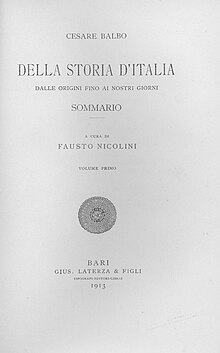Cesare Balbo
Cesare Balbo (born November 21, 1789 in Turin , † June 4, 1853 ) was an Italian statesman, historian and writer. He is considered a representative of neoguelfism .
Life
At the age of 17, Cesare Balbo became an auditor at the Council of State in Paris, in 1808 secretary of the government commission that carried out the unification of Tuscany with the Empire, and later of the Konsulta appointed for the same purpose for Rome.
In 1812 he became French government commissioner for the Illyrian provinces , after Napoleon I's overthrow, a Sardinian officer and was attached to the legation in London for some time , but resigned as a major from the army as a result of the Piedmontese revolution of 1821.
In Turin he devoted himself to historical studies and published several works from 1821 to 1843, including a “History of Italy” ( Storia d'Italia ), which, however, only reaches as far as Charlemagne in two volumes , and a translation of Heinrich Leo's “Development of the Constitution of the Lombard Cities ”( Communi italiani ) with commentary.
He was first made more generally known in 1843 by Le speranze d'Italia , in which he declared that the independence and unity of Italy must precede freedom. All moderate liberals gathered around this slogan. Balbo's “Compendium of Italian History” (“Della storia d'Italia dalle origini fino ai nostri tempi”, 11th edition, Bastia 1860.) was also widely acclaimed for its extensive knowledge of history, and its robust and specific style.
In addition to smaller historical and political writings, Balbo provided articles for the Turin journal Risorgimento . As the head of the moderate liberals, he had held a prominent position since 1847. He was hostile to the democratic party from 1848 to 1849, but took an active part in the war against Austria . Since the constitution of February 8 (March 4) 1848, Balbo's friends and men from his school led the government in Sardinia, in which he only took part for a very short time. He was also always on friendly terms with the Azeglio Ministry . After the death of King Karl Albert he withdrew from the public and died on June 3, 1853. A few weeks before his death he was admitted to the Accademia della Crusca , but could no longer answer the message.
Works
- History of Italy
- Compendium of Italian History
literature
- Ettore Passerin d'Entrèves: BALBO, Cesare. In: Alberto M. Ghisalberti (Ed.): Dizionario Biografico degli Italiani (DBI). Volume 5: Bacca-Baratta. Istituto della Enciclopedia Italiana, Rome 1963.
- Hermann Reuchlin : Pictures of life for the history of modern Italy . Beck, Nordlingen
- Count Caesar Balbo. Dedicated to the German patriots . 1861
- Ercole Ricotti : Della vita e degli scritti del conte Cesare Balbo . LeMonnier, Florence 1856.
Individual evidence
| personal data | |
|---|---|
| SURNAME | Balbo, Cesare |
| BRIEF DESCRIPTION | Italian statesman and writer |
| DATE OF BIRTH | November 21, 1789 |
| PLACE OF BIRTH | Turin |
| DATE OF DEATH | June 4, 1853 |
| Place of death | Turin |

